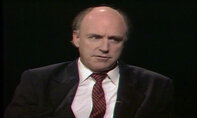- About Us
- Columns
- Letters
- Cartoons
- The Udder Limits
- Archives
- Ezy Reading Archive
- 2024 Cud Archives
- 2023 Cud Archives
- 2022 Cud Archives
- 2021 Cud Archives
- 2020 Cud Archives
- 2015-2019
- 2010-2014
- 2004-2009
 |
The Cud Book Review: |
Lorin Clarke has written a powerful memoir ‘Would That Be Funny? Growing Up With John Clarke’ (Text 2023, 270pp). While the book reveals much about John’s personal life as parent, the public character of the philosopher, satirist and wordsmith shines through.
When John Clarke died suddenly in 2017 the grief was widespread. Whether it was because of his down to earth, iconoclastic humour or because of his essential decency, all Australians – and Kiwis from his Fred Dagg days – felt that they knew John and lamented his passing. Perhaps there was some consolation in the fact that he spent his last minutes engaged in one of his favourite pursuits, bushwalking and birdwatching in the Grampians.
If the national grief arose from our belief that we each had a relationship with John Clarke, how much sharper must have been the sense of loss experienced by his beloved family – the ‘sisterhood’, partner Helen and daughters Lorin and Lucia? You could but wish that this memoir is partial healing for those three women who were such a huge part of John’s life. When asked whether Malcolm Fraser had become more compassionate and humane in later life, John said that the former prime minister had no choice because he had daughters.
The sisterhood could be hard on John They teased him at every opportunity, especially when interviewers made silly claims about his domestic skills. But they loved him and Helen dearly. They were curious about their ancestry and developed good relationships with their various grandparents. The happiness enjoyed by the Clarkes was slightly surprising given John’s own upbringing was not particularly loving. His father and mother were both damaged by wartime experiences and when they divorced, John was called as witness in the proceedings. His father, who had social pretensions and displayed little affection for his son, sent John to a private school where he was brutalised and told he would never amount to anything.
When ‘courting’ Helen however, John found that her family enjoyed life and quickly came to respect him. John said that Helen was genetically incapable of ever telling a lie. They first met over an argument in a London pub and John told their daughters their Mum was one among thousands. Helen became a highly qualified feminist art critic and often worked at home – ‘referencing the tropes’ as the others teased. She used a Munch-like ‘scream’ to shift from her isolated academic world into family mode as the girls arrived home after school. Helen made sacrifices, forgoing a year’s research in Italy because John was busy. When asked about the secret of a happy life, John answered truthfully that it was finding such a great partner.
Small wonder that everyone loved John. He had time to talk and was genuinely interested in people. Like many correspondents, I wrote to John not expecting a reply but the man was generous in his response. I suggested that he and a certain Liberal politician were never seen together because in fact, the MP was a JC creation. John’s answer included warnings about men in black balaclavas and vicious dogs, but I treasure it.
In a sport obsessed society John’s irreverent creation of farnarkling touched a nerve. After he died, the Age newspaper returned a folio of letters they had received entering the spirit of the mythical game. John was not simply a humorist but he appreciated and encouraged humour by others. In their interview series, Bryan Dawe noted that to avoid breaking into laughter, he avoided looking John in the eye. That twinkle was a rare and precious thing.
John enjoyed teasing bureaucracy. He took Yarra Council to task for spending millions on a street cleaning company which failed to clear the leaves from a drain outside his house. He also formulated a plan to thwart toll roads, which he hated. This involved placing a copy of some of his work on the roof of his car. If the toll company took a photo of the car, he could sue them for breach of copyright.
John also shared my aversion to flying and mobile phones. I am not sure of the terms for these conditions, but John probably had his own. One of the strongest themes in this book is his love of words, including neologisms and nicknames, a love his family shared. How could they not when tapes played on car journeys included Dickens, Seamus Heaney and the Goons? John was quick to identify hypocrisy and cant. He observed that ‘the reality is’ must be a tautology and when asked to define satire he said it was ‘a response to the process whereby politicians and public figures hold the community up to ridicule and contempt’.
Lorin Clarke’s memoir of her father is an enjoyable read. It has several photographs to help set the scene. It might not alter the public understanding of John, but complements it very well. As might be expected, it is an intimate portrayal of the family and goes beyond the television images. The book has brief chapters with specific focus. I particularly enjoyed the lists of things which remind Lorin of her Dad and of things which make her think she is like him, or like her Mum. The book is totally free of cynicism and is a fine tribute to a man who gave us so much.
Dr Tony Smith is a former academic who now spends time busking and writing songs and reviews. He lives in the bush in the NSW Central West.
